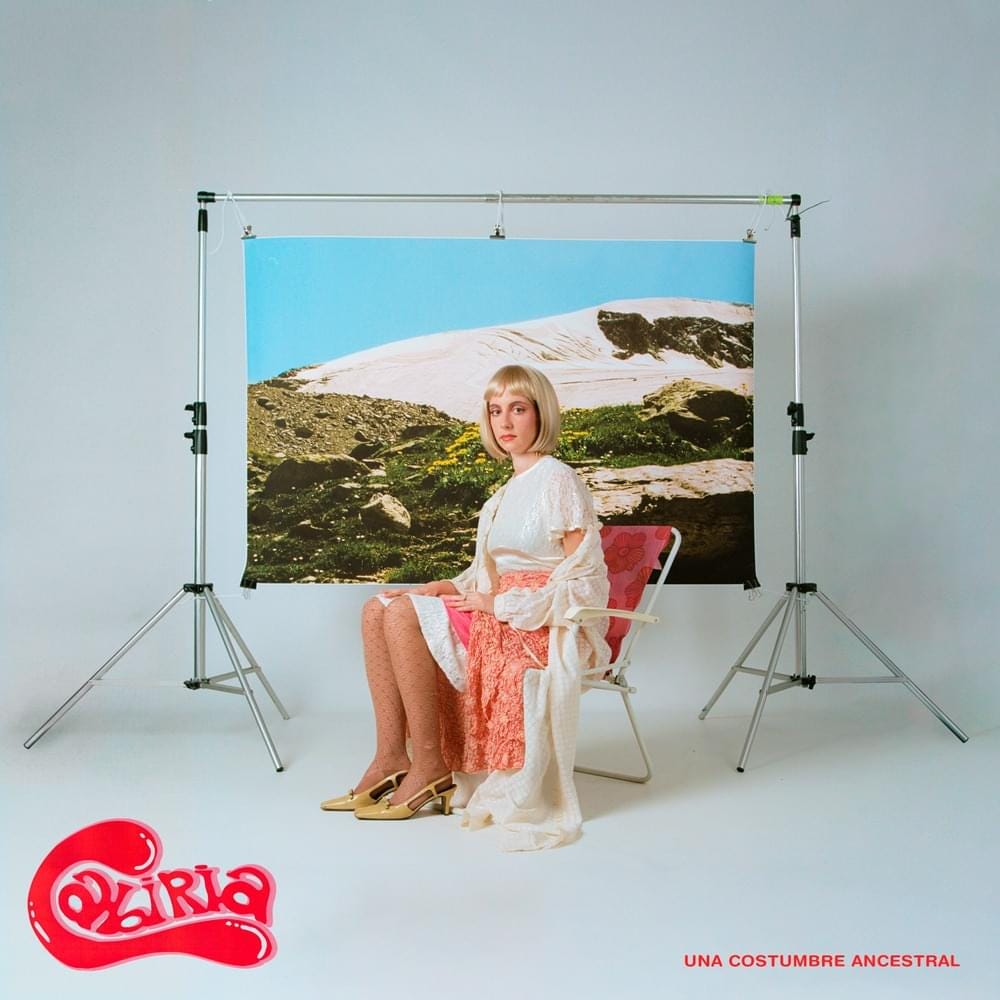Cabiria - Una Costumbre Ancestral
Songs for Life; an attempt at music review and less-sombre, more musical musings.
Once a month, I will post a brief review or reflection on an album or track which I would keep for life, or which has made life worth living. Here’s the second entry.
My tank of gas ran out of, well, gas, and the shower in my Tijuana apartment became a sensory deprivation tank. I entered it soap on dry hair, grimacing in what felt like the room aboard a ship where the innards of tuna are washed out of parasites before freezing to prep the fatty red meat for human consumption. I had spent my paycheck too soon and so this was the pathetic state (hungover, struck out at the gay club) I was in when I first heard the opening chimes of Cabiria’s most successful, to date, slice of Mecano-nostalgia dreamscape shoegaze releases. Cabiria in general, but Una Costumbre Ancestral especially is full of nostalgia for the glorious past of the trio and the more recent past of Spain’s alternative-indie-pop giants—for lack of a succinct description. (Dreampop seems offensive, frankly, I rebuke it). It’s like Ana Torroja singing Astrud or Hidrogenesse sung by Annie or Denise of Belanova (but on key and not derogatory).
Her debut album, Ciudad de las Dos Lunas, was a strobing flash of colored lights whose frivolity and froth still showcased a creative writer and a lyricist with an ease for evocation and allusion that is usually anathema in pop music. The digital cover of the album, a selfie (of course), manipulated beautifully and skillfully to resemble to glamour shots in 80s hair salons or which hung over windows in strip clubs or discotheques to hide the shimmering debauchery on blades, rollers or stilettos inside. It recalled immediately the tianguis stalls of San Juan de Dios with the USB sticks hanging in dime baggies with photos of their covers. Vintage piece of pop nostalgia from someone who was born even later than I, just too late to see similar images of Daniela Romo or Paulina Rubio in glamorous washes of neon gestural brushwork or space helmets with green neon and blue argon typography of Planeta Paulina.
Cabiria herself is a mystery to me, someone on Twitter and Youtube who has uploaded now a discography which would have been the toast of Popjustice or the indie poptimist set before the demise of Pink is the New Blog or the day the Livejournal mods banned the Sean Cody avatars from Oh No They Didn’t and subsequently, our loyalty as devotees of the first amendment. I could see Bryan Higgins or Richard X throwing many of her tracks on playlists or Ibiza sets, in between hardcore industrial remixes of Girls Aloud’s Androgynous Girls. It could replace the Sophie Ellis-Bextor track on the fever dream of the Popjustice compilation which gave us, pray tell and thank god, Mutya Buena’s Out of Control (that’s who has replaced me? Wot a dis!).
If you need a comparison which only means anything to a gay man in his 30s, she recalls Annie, or maybe Margaret Berger (pre-Eurovision, still ensconced in cool electronic and synthetic instruments which bleep or blooped and then menaced á la Destroy Everything You Touch), definitely Bertine Zetlitz at her least macabre (Apples and Diamonds, Snow on a Hot Day). But beyond the bombs of synthesizer glitter, it’s her voice, that fairy quality and mousse of a timbre that is inevitably going to be compared, or maybe is already by tastemakers and festival planners, to the virtuoso and operatic sighing and cooing of Ana Torroja.
The comparison to Mecano is inevitable and it is not one to be made lightly as the trio of Ana Torroja and the brothers Cano cast a long shadow over Spanish-language popular music & song. Their lyrics, slices of life and vignettes depicted a post-Franco awakening to the flowering of public and gratuitous homosexuality or the rage of divorced women (see, Perlita de Huelva El Divorcio) among many more mundane changes (See Hidrogenesse’s 1987). They sang about the hangovers of now-cheap French champagne at the Cybèle or at the Moncloa’s gates, protesting or celebrating. Their hits are historical documents, a feat for a pop band and literature, a near impossibility for any musician, usually.
Cruz de Navajas, a deposition in song about a crime of passion, beautiful in Ana Torroja’s melodic exhaling, utterly shocking in Celia Cruz’s chest voice (to be covered by Celia, high honors). La Fuerza del Destino, a song so beautiful, haunting and with a punctum where other songs have middle-eights, so moving, so universal in its theme and longing and star-crossed destiny that it revived Fey’s (Mexico’s answer to Britney, but a decade early) career from Coppel Canada spokesperson and failed satanist electronica vanguardist to icon and anchor of every gay pride in Latin America, ever. Mujer Contra Mujer, perhaps the most sapphic song sung by a heterosexual woman and written by a heterosexual (allegedly) cisgender man. Barco a Venus, a tribute to mendacious escapism or compulsive liars inventing past lives or adventures which, like a boat to Venus, seem a little sus.
The most obvious reference here though is the tianguis anthem, the nod at chicas y ‘manas at the pacas, Busca Algo Barato. Cabiria’s Una Costumbre Ancestral directly evokes comparisons to this song even if in its coyness and shimmering pink layered vocals it does not immediately reference or draw clear comparisons to Ana Torroja’s dedication to shopping second hand (pre-SATC, before it became chic). Both are Absolute Bourgeois Bohème (Ab-BoBo), Cabiria’s just slightly less twee.
Una Costumbre Ancestral is indeed just a simple ode to the pleasure of picking through second hand clothing, draping yourself in vintage (1999). The shimmering effects throughout the track conjure images of beads or sequins shuffling, rattling or vibrating as the oversized vest in purple and green peacock or parrot arrangements is shoved to the side to find a Helmut Lang skirt or maybe a Tommy Jeans pair of cargo shorts. The multiple layers of breath and her vocals, like the cut glass broach in the vitrine at the Goodwill in La Cañada-Flintridge, dazzle and envelop when you finally get the lossless download and your best earbuds to simulate motion tracking. It’s not just cute for effect or affect, you can sense a young artist working through her craft and mastering the production and arrangement which, I hope, will one day give us a transatlantic banger worthy of three decades of Spanish pop music mostly unknown to American melómanos, or offer us a bridge to the glorious, sardonic pop of Vamos a Casarnos (sung by Single). May we leave Morissey and find una discoteca llena de Maricas.
Cabiria is thoughtful, generous, throws aging gay men no longer with it with a bone, giving all three art historians pining for a sequel to Las Bistec’s H.D.A. something new to pin our identities on. She references the cave paintings at Lascaux, she shuts her eyes so tight they paint pygmy rhinoceroses on her eyelids. Cute. (slides in caddy rustle in celebration). ¿Quién fuera cueva neandertal? (Who would be a neanderthal cave, I mean!). The line about Method actresses is just proof she’s writing circles around other artists her age.
Una Costumbre Ancestral’s structure, the verses which repeat almost seamlessly because of the space and the slowness of her phrasing and delivery. Hidden between synth and breath, the lyrics seem secondary until the lines are slogans lingering, congealing only into verse when you have the text before you. In its abstraction and devotion to not saying or showing, but alluding or gesturing to, there something quite ingenious and quite remarkable.
The tempo which suddenly seems to increase like the heart rate of an ingenue spotting that Rodarte for Target dress amongst many, many Torrid and Gap tshirts, elicits, for me, a rush of optimism and hope in the future of the world. The tones that open the chorus sound like wedding bells, it’s a beautiful sensation when you let your incredulity leave you.
But, It’s the line, “a heart so pink that my molars ache” (much more beautiful in Spanish), that I find myself singing over and over in the bathroom or as I walk down the streets thinking and sighing and beating to near-death the memories of beautiful trembling blue eyes which squinted and scanned my silk shirt (Monsieur Givenchy, secondhand from the Palmdale Goodwill, 8 dollars) which frayed to nothingness years later from sweat and the friction of office work. I know she’s singing about a sweater with apliqué or perhaps a handbag with a pink heart in diamantine. But, when I listen to it again, now for this quick review, it seems as if she sings about the love of a lifetime. Maybe, specifically, my love of my lifetime. Puede ser.
Cabiria’s Una Costumbre Ancestral is now my litmus test for innocence and credulity, if you don’t understand the exuberance and the earnestness, we may have issues shopping in Goodwill or Out of the Closet or Buffalo Exchange together. Our love could never survive Ikea or Costco.
Four minutes and three seconds of sentimental longing for a sweater or a purple vinyl jacket, which I suspect Cabiria might agree is a stand-in for a lover or a friend. Or, the joy of self-fashioning and self-expression in the face of antagonism for honesty. The song is a glimpse into a fellow traveler whose eyelids have the ochre and soot hands of hominid ancestors painted as they shut tight, for fear of finally finding something amongst flotsam and recycled garments, hoping it fits.
The Rembrandt reference in one of her subsequent releases, Como Si Se Inclinara (10/10, an incredible surprise), is just gilding the lily. You’ve already won me over, prima de otra peninsula, stop making me giddy.
If you don’t get excited about music that makes cynics like me giggle and scream, fine. But, give it a shot, you may find something among the reverb. Maybe a vintage feeling?





